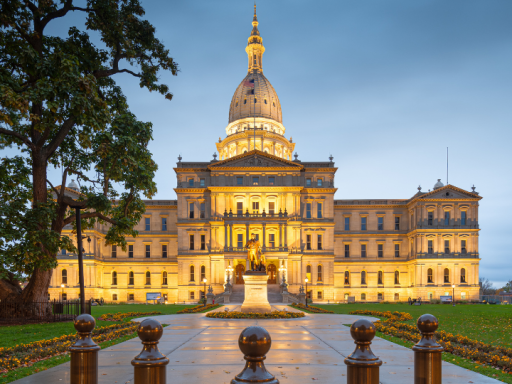Governor Gretchen Whitmer released her fourth executive budget recommendation for the upcoming fiscal year 2023, a $74.1 billion plan to invest in education, economic development, public health and safety and the state’s infrastructure.
"Just two weeks ago, I delivered my State of the State address, where I outlined the bipartisan accomplishments of the past three years and shared my vision for the future. I laid out plans to cut taxes for seniors and working families by rolling back Michigan's retirement tax, giving more than 500,000 households an average of $1,000 a year and raising the Michigan Earned Income Tax Credit, putting an average combined refund of $3,000 back in the pockets of 730,000 working families," Whitmer said. "The budget I put forward today delivers on those tax cuts and makes strong investments in the kitchen-table issues that make a real difference in people's lives."
The budget recommendation includes a school aid budget totaling $18.4 billion and a general fund of $14.3 billion. The school aid budget marks the largest increase in more than 20 years without raising taxes.
We’re sharing key highlights from the budget which support education, mental health and more.
Education
• $580 million to increase base per-pupil funding by 5% from $8,700 to $9,135, which equates to $435 per student.
• $31 million for additional supports for vocational education and career and technical education.
• $1.6 billion for educator retention programs.
o $1.5 billion for payments to eligible teachers, administrators and support staff who continue working in their school district over the next four years.
o $50 million annually for teacher onboarding and mentoring programs.
• $361 million for student mental health to ensure students with mental health needs can be identified and provided with the right support.
• $600 million for educator recruitment programs including scholarships for future educators, stipends for student teachers and training opportunities and programs.
• $72.6 million for pre-K education programs, including $56 million for the Great Start Readiness Program to increase the full-day allocation from $8,700 to $9,135 per student and provide start-up funds for new programs and classrooms.
o The budget also includes increased funding for early identification and intervention services for younger children through the Early On Program as well as through home visitation and early childhood collaborative efforts.
The school aid budget also includes support for school safety programs, school infrastructure, before and after school programs, reimbursement of costs for special education students and literacy-related programs in Detroit Public Schools.
This Thursday, February 17 at 12:30 p.m., CMF’s P-20 Education Affinity Group will be hosting a briefing with Whitmer’s policy advisors to unpack the governor’s budget recommendations for education.
Economic and Workforce Development
• $500 million to provide hero pay for frontline workers in recognition of their work amid the pandemic.
• $500 million deposit into the Strategic Outreach and Reserve Fund to provide funding for economic development projects that invest in Michigan's future.
• $10 million investment for rural development engagement and support to fund the Office of Rural Development to help rural communities meet workforce, education, infrastructure and connectivity needs.
• $230 million for Transformational Education Infrastructure to promote new collaborative approaches among higher education institutions and other partners in health science and medical education.
Other highlights include:
• $8.3 million to provide $100 per month per child ages five and under to assist families who earn lower wages.
• $10.5 million for a child welfare services rate increase, which increases state rates to residential child caring institutions serving foster children by 5% and private residential juvenile justice providers by 12%.
• $20 million to address racial health disparities.
• $578 million in funding from the Infrastructure Investment and Jobs Act to provide resources for projects fixing roads, bridges, railways and local and city transit. Plus $480 million in fiscal year 2022 to increase road and bridge construction for state and local roads, highways and bridges.
• $50 million for first responder retention, $9.2 million for a state police trooper recruit school and $1 million to help diversify the department.
• $69.3 million for cleanup of contaminated sites and $34.3 million for high water infrastructure grants focused on addressing flooding, coastline erosion, transportation networks, urban heat and storm water management.
The proposed budget will need to be approved by lawmakers before it goes into effect for the 2023 fiscal year beginning on October 1.
Want more?
Read the full proposed budget.
Join the Green & Blue Network on March 9 for a behind-the-scenes debrief from the U.N. Climate Summit held in Glasgow in November 2021 and explore what the outcomes may mean for the Great Lakes and the network. J. Carl Ganter, co-founder and managing director of Circle of Blue, will share first-person insights from the summit.
Join CMF’s P-20 Education Affinity Group for a debrief on Whitmer’s budget for education. Register.
